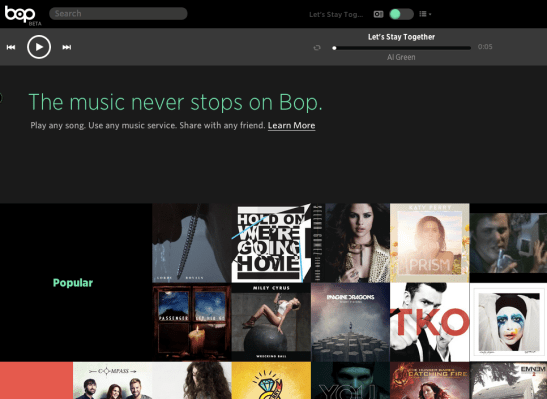Competition for listeners among digital music companies is tough — and getting tougher. But while each builds a business that it hopes will stand out enough from the rest of the pack, a new startup called Bop.fm, incubated at Y Combinator this past summer, is blurring those distinctions a bit, with a platform that meshes all the services together on a universal platform — a “canonical home for music on the internet,” as Bop.fm’s co-founder and CEO Shehzad Daredia puts it.
Bop works like this: You can search for and listen to any song on Bop.fm. The service detects what music subscriptions you may have and provides tracks from those services first — currently it catalogues streaming services Spotify and Rdio, as well as free services like YouTube and SoundCloud, and paid-for download services like iTunes, Amazon and Google Play; it plans to add more.
In cases where you do not subscribe to Spotify or Rdio, or the track is not available on either, a user is given a YouTube link, or a SoundCloud link. You also get options to buy and download tracks. In each case, what Bop.fm has done is use the digital “fingerprint” of each track effectively to map each of these services on top of each other so that you get just one option for listening to it, and one for purchasing.
Then, you can create a link to that song to share with others. That link comes back to Bop.fm, and as with your original listening experience, Bop.fm detects which services you use before serving a result.
This is a service that has been built with users in mind: it can be annoying when something is shared by someone you can’t access. Living in London but connected to a lot of people in the U.S., I know this frustration firsthand. (I’ve lost count of the number of times that Twitter links to interesting video clips have taken me to static screens with a “sorry, not accessible in your region” message.) As Daredia tells me, “You don’t have to use the same JPEG viewer when you look at a picture, so why should I have to use the same music service?” (Note to Bop.fm: please do this for video next.)
There is also a B2B2C relevance here. Publishers or site operators who want to make sure that links that they are publishing, or allowing others to publish, work for everyone who sees them, not just those in a particular region.
As Geoff Ralston of Y Combinator describes it, “The ongoing proliferation of music services such as these make a service like Bop a near inevitability.” Indeed, without any obvious promotion, Bop.fm, in private beta, is already streaming 100,000 songs per day from consumer traffic and sites like RapGenius.com, one of Bop’s first partners, where it powers music playback.
(And now, for a little music break to demonstrate the service, a hat-tip to music services working together harmoniously:)
When I first heard about Bop.fm, I was very intrigued. It reminds me a bit of another startup called Soundrop, which is also integrating track playback across different music services. The difference is that it does so in communal “listening rooms” while Bop.fm offers the experience on a single-track basis, with options to purchase tracks alongside listening.
Like Soundrop, Bop.fm has piqued the interest of music portals, as well as labels. For the former, it’s a way of potentially bringing in more users to their platforms longer-term (free links can lead to paid subscriptions or paid downloads). For the latter, it will be yet another way of making sure that the marketing effort expended on an artist gets the biggest bang. In a digital music world that seems to have had fragmentation built into it, Bop.fm is providing a consumer- and business-friendly way out of that.
Between them, the two co-founders, Daredia and Stefan Gomez, know a thing or two about how to leverage the concept of aggregation to build successful, consumer-focused businesses. Daredia tells me that collectively they have worked at 11 sites built on search, including the travel juggernaut Kayak (where Daredia led user acquisition), Billshrink (eventually sold to MasterCard) and Foodily.
Longer term, you can see a lot of potential for Bop.fm — the addition of playlists, more siloed music services, advertising, other merchandising and special pages dedicated to particular artists, as well as Bop being used to power music on platforms that, like Bop.fm itself, want to see less friction and more grooving.
